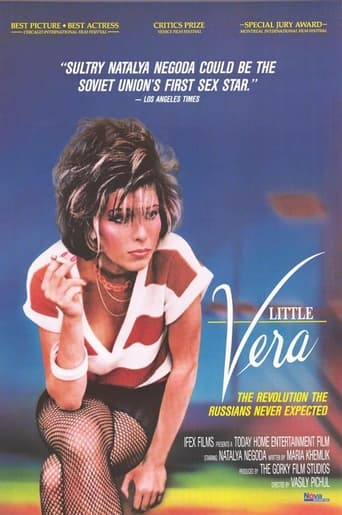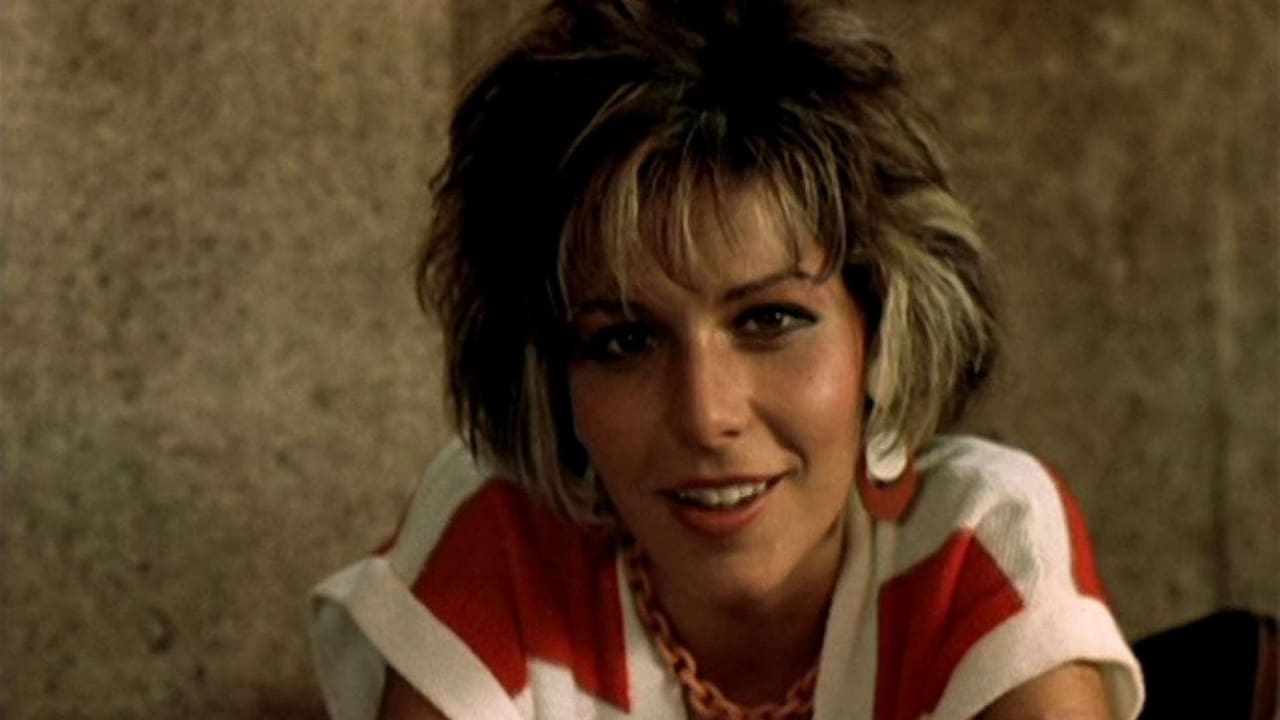mmx
It's alarming, to say the least, how little the English speaking world knows about Russia's past. Everyone keeps saying Russia, but I grew up in the Soviet Union, and I can't really call it an exclusively Russian film like everyone else. Ironically, this movie was filmed in Zhdanov(Mariupol), which is now a part of Ukriane. The director chose this city because that's where he was from and he wanted to show the reality of life there. This city always been a ghetto. Now it's even worse, since that part of Ukraine is engulfed in a civil war. So the hopeless openededness of this film was right on point. Unfortunately, I have a feeling the main character would most likely die sometime in the 90's to early 2000's. Even moving wouldn't help, cause the whole area of the former Soviet Union later became a total cesspool of violent crime and drug/alcohol addiction.During the late 80's, right before the Soviet Union collapsed, there was a plethora of similar films, but for some weird reason only this one was known outside of the country. There were films with worse sex scenes before and after this one, and unlike many other countries, there was no censorship, so TV was full of nudity at the time. So I am really confused why this was praised for a "sex scene", or "rock n' roll"(?!). This film is none of that. This era of Soviet film was actually called "Chernuha" which translates as darkness, despair, gritty. Films during this time were full of realism, had this art-house vibe and yet very genuine acting, and always had a somewhat hidden psychological or philosophical dilemma in it. Sounds like Oscar's winner Moonlight. Indeed, if Moonlight took place in the 80's Soviet Union, and instead of drugs people were drinking, it would fit right in. Some scenes are almost identical with those Soviet films. (i.e. filming a pot on a stove for a good 1 minute or so, or a character is staring at something or thinking for a long time.) I actually seen a lot of them when I was a kid, but it took me decades to watch most of them again. Many never been preserved and therefore are in a very bad shape and some I still can't find, so they were pretty much lost during the switch to the digital format. During the 90's, Russian society rejected everything from the Soviet era. Even this film would have probably been lost if it wasn't for this unusual international hype about it because of some naive sex scene. There are some odd moments in the film that I only noticed when I watched it as an adult. There is really good and rare collector's items Italo-Disco(CC Catch) blasting from TV during the house party. A phenomena of an underground music style in North America that was only played at gay clubs, was actually a mainstream thing in the Soviet Union. Then there is a clear pedophile situation at a cafe between a man and a very young girl. Another strange scene is where Vera gets accidentally hit by a pot in the head by her drunk girlfriend with a black kid. It was also sort of disturbing to see how she was calling him names and screaming at him when she was drunk, which followed by a scene where he was alone watching a silly cartoon on TV about staying away from Africa because it has dangerous animals, while it's very obvious that life for this kid with black skin in that hell hole of a town is probably worse than being in an African jungle...The film is as real as it gets. The life was like this for most of the Soviet Union back then. So I definitely would recommend it as a learning artifact. Also Vera means hope. So the name of the film in Russian means also "A very little hope".
vbb76
I'm from an ex-communist country, SFR Yugoslavia, which didn't belong to the Eastern Bloc, but it was non-aligned and more liberal than the USSR. Erotica, violence and social commentary were common in our films and we had an access to western films. Maybe that's an explanation why "Little Vera" did not impress me much, no matter how "daring" it was for the soviet standards. This is one of the worst movies I've seen in my life. How come it received such awards and even a sort of cult status? The Wall Street Journal bombastically (mis)described it as: Sex, drugs and rocknroll! The Time Magazine praised it as: A smash hit! If you are looking for a soviet film along those lines, then forget "Little Vera" and watch "Avariya doch menta" (Avariya the Cop's Daughter).It's a rough social drama about the youth subcultures during the turbulent period of the Perestroika and it offers much more action and tension than "Little Vera".I thought that "Little Vera" would be something similar and although it's beginning was somewhat promising, I soon realized that my expectations were wrong.After some scenes of parties and violence, the movie slowed down and for the next hour and a half, it's protagonists were only mumbling something among themselves. It was painfully slow. Nothing much was happening, until suddenly everyone went nuts and almost killed each other for no apparent reason."Little Vera" is overrated just because it was the first soviet movie with a more explicit erotic scenes and it's main actress Natalya Negoda became the first real soviet sex symbol. That's all about the "importance" of this film in the history of cinema. Explicit erotica was a shocking novelty for the soviet audience in those days, but naked breasts and simulated sex alone do not make a movie great.Speaking of drugs, there is some abuse of legal tranquilizers mixed with alcohol in the film, but this is not a story about heroin addicts or something like that, as some of you may expected.The "rocknroll" in "Little Vera" is actually the bubble gum pop singer Sofia Rotaru, who was already 40 at the time of the filming. Not much a "youth rebellion". In comparison, "Avariya doch menta" features punk rock and heavy metal music, which was much more dangerous and radical in those days.The Wall Street Journal's "Sex, drugs & rocknroll" description only partially fits "Little Vera" and it's misguiding to a large extent. And it's not really a "hit movie" as the Time Magazine said. On the contrary, "Little Vera" is more a sort of psychological drama.Some of the movie posters that I found online are also misguiding. They would make you think you that this is a crime movie. or even an action-comedy.I'm not so much disappointed by the movie itself, but I'm more disappointed by it's inaccurate description and the exaggerated praise in the media.I understand that "Little Vera" has some qualities. It was noticed not only for it's explicit erotica, but also for it's social commentary.It shows the depressing provincial towns of the Soviet Union and families living in small claustrophobic flats. It shows how the youngsters began to rebel against the authority during the Perestroika.Vera's father is depicted as a drunk, while her mother is like "what the neighbors will think". You get the picture.Back then this was considered a brave social criticism.But anyway, the film left me completely emotionless. I felt absolutely no sympathy or compassion for Vera, even less for her boyfriend Sergei (Andrey Sokolov), who behaves like an arrogant pr****.Even the drunk father was a more interesting character in the film than both of them, though they are the main protagonists in it.If you are looking for more "edgy" films about the youths in the former USSR, then watch the aforementioned "Avariya doch menta", then "Menya zovut Arlekino", "Patsany", "Rokovaya oshibka", "Luna Park" or the more recent "Lilja 4-ever".
pelotard
Forget every spy movie you've ever seen - this is what life was like in the USSR, and still is in many places in Russia and the ex-Soviet countries. Vera dreams of life of leisure, as she imagines the West to be; her reality is very different, with a bitter mother, a violent father, and the ever-present alcohol. And her prospects for the future are not much better. She finds a man and they try to patch up a life together, but he is afflicted by the same environment, both socially and physically - the scenery in this movie is brilliant, sitting comfortably in the company of post-apocalyptic movies but obviously done with no special effects; they have just walked in and shot whatever happened to be in front of the camera.Forget your stereotyped, cold Russians of spy movies. This is the Real Deal: people are passionate, vibrant, and present in a way you'll never see in a drama from the West.
havran_del
A gritty presentation of the decay of family values and human dignity in the wake of Soviet communism, Vasili Pichul's 1988 film Little Vera is a landmark film of modern Russian cinema. Pichul's brutal drama marks a strong departure from the images of sanitized idealism promoted in Soviet times (as in Aleksandrov's Circus), brashly moving the social chaos of his time into the public spotlight. A contemporary Ukrainian setting further intensifies the effect, first by the immediacy of the film to its time period, second by its utilization of a locale not only struggling for identity in lieu of a Soviet system, but also as a nation distinct from the Russian idiom that had dominated the U.S.S.R.Vera, the film's title character and protagonist, is a rebellious adolescent girl with a "dysfunctional" family including a hard-drinking father and a mother care-worn. Rejecting her would-be beau Andrei, Vera begins a destructive (and primarily sexual) relationship with a college student named Sergei. Despite her parents' dislike for the lazy Sergei, and despite Sergei's rude contempt for her parents, he moves into their cramped apartment. Tensions escalate until Vera's father drunkenly stabs Sergei. Vera must decide if she will stay loyal to her intolerable family by testifying her father acted in self-defense, or continue to support and defend the ever-detached Sergei. Unbearable in almost every imaginable way, Little Vera masterfully captures and communicates the inescapable void left in social life after the collapse of communism. The sexual aggressiveness of the film (it was the first film to show explicit sex) combined with the unrelenting presentation of social reality (a marked distinction from the socialist realism demanded by Stalin) effectively confronted the conditions of former-Soviet life. Most interesting, however, was public reception. While many wrote hate mail to the director and star, the film was wildly popular. Here the double-edged nature of "film as social criticism" emerges: if done correctly, the film will make the audience uncomfortable. Because no easy solution presents itself, some viewers will hate the film and filmmakers for "bringing up" the issue. Many films come to mind as somewhat comparable in this regard: Larry Clark's Kids, Harmony Korine's Gummo, even popular movie's such as John Hughes' Breakfast Club. I recommend this film to those viewers for whom the prospect of nearly two hours excruciating domestic conflict and social miasma is not overly daunting. The film is absolutely beautiful, and incredibly challenging. Despite the difficulties of watching the film, some moments within it are profoundly beautiful. Of course, the socio-historic and cultural significance of the film cannot be overlooked, and in fact operate as an even more assertive reason for watching this film.


 AD
AD

